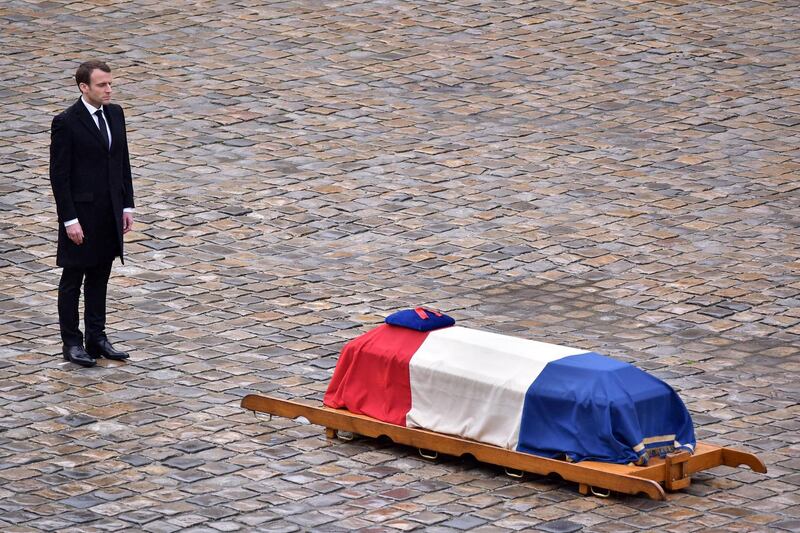With stirring tributes to the gendarme who sacrificed his life to save a terrorist's hostage, and an 85-year-old Holocaust survivor "murdered because she was Jewish", President Emmanuel Macron presented France as a country united against barbarity.
But behind the statesmanlike words lies a painful reality. France is struggling harder than ever to achieve social harmony or contain the extremist threat. It is not united at all.
Only a tiny minority of France's Muslim population – Europe's largest, although estimates vary from two to six million – have any desire to carry out terrorist attacks or harm Jewish neighbours or strangers.
But the limits of policy have been exposed by the attacks in and near the beautiful walled town of Carcassonne, southern France, on March 23. Lt Col Arnaud Beltrame – posthumously promoted to full colonel – was one of four people killed by Radouane Lakdim, a French-Moroccan ISIL sympathiser.
Mireille Knoll's murder in Paris a day earlier highlighted growing insecurity among France's Jewish community. Once, only the far right seemed to target Jews, mostly in words but sometimes in deeds. Now commentators detect a disturbing level of anti-Semitic hatred from Muslim-dominated city suburbs to mixed inner-city districts.
_______________
Murdered French attack hero honoured in grand national homage
France pays tribute to hostage-swap policeman after terror attack
_______________
Anti-Semitic motives in the murder of Knoll, who escaped the 1942 round-up of Jews in Paris and was sheltered in Portugal during the Second World War, have yet to be established, although one of the two accused claims his alleged accomplice shouted "Allahu akbar" as the attack began.
Yet terrorism remains the main threat in France.
France's interior minister, Gerard Collomb, said in February that two attacks – one on a major sporting facility, the other on soldiers – had been foiled since January, adding to 20 thwarted plots last year.
But France has almost 20,000 people listed under the so-called Fiche S scheme as possible threats to security, ranging from individuals attracting mere suspicion to those who joined ISIL and similar groups in Middle Eastern conflicts. Without an improbably vast increase in resources, the security services cannot monitor all of them, least of all 24 hours a day.
Lakdim, 25, in common with many of those involved in European terrorism in recent years, had a history of petty crime. He was suspected of having been radicalised, but Francois Molins, the chief Paris prosecutor, says there was nothing to suggest he was preparing to "pass to the act".
His 18-year-old girlfriend, a French convert to Islam identified by the media as Marine P and also on the Fiche S list, led an outwardly normal life despite concerns about her activities and outlook.
On the morning of Lakdim's attacks, she posted a message online demanding "hell for non-believers".
In a moving speech at the national homage to the murdered gendarme last Wednesday, Mr Macron said: "As the name of his assassin sinks into oblivion, the name of Arnaud Beltrame becomes synonymous with French heroism.
"It embodies the spirit of resistance that is the supreme affirmation of who we are, what France has always fought for from Joan of Arc to General de Gaulle; its independence, freedom, spirit of tolerance and peace against all hegemony, all fanaticism, all totalitarianism."
Yet not everyone in France agrees with those sentiments.
For all Marine Le Pen's attempts to eliminate the anti-Semitism that, along with Islamophobia, has characterised her far-right Front National (FN), founded by her now-excluded father, Jean-Marie, unsavoury elements including Holocaust deniers continue to surface. Her own party officials admit that this remains a barrier to mainstream support.
The far left, represented by Jean-Luc Melenchon, leader of La France Insoumise (France Unbowed), also harbours anti-Semitic elements.
Like Ms Le Pen, he was asked by Jewish leaders to stay away from a silent march in honour of Knoll a few hours after the homage to Beltrame. Encouraged by the wish for inclusiveness expressed by the victim's family, both attended anyway but were booed and had to be escorted away.
Ms Le Pen returned to join the march and insisted it was "her place". Mr Melenchon took his exclusion more philosophically but, along with the leader of Britain’s opposition Labour party, Jeremy Corbyn, must be aware of the left's role in the rise in anti-Semitism across Europe that goes beyond disagreement with Israeli government policy.
Within Muslim communities, moderates also face problems in confronting unpalatable views. Imams seek to drive out hard-line elements but, often enough, find themselves asked to comment on terrorist attacks allegedly committed by locals they have never seen at their mosques.
Some of those living in Muslim-dominated districts treat their territories as no-go areas. In Carcassonne, French and foreign television crews visiting the neighbourhood where Lakdim lived were verbally and physically attacked by a handful of youths.
Eric Ciotti, a security specialist within the ranks of France’s main opposition, the conservative Les Republicains, cited the aggression towards journalists as an example of the “Islamism” that pervades many suburbs with large Maghrebin and sub-Saharan African populations.
"Nobody reacted; it's astounding," he said.
For France’s president, the battle is a long way from being won and goes far beyond thuggish behaviour in response to unwelcome media presence.
"It is not only the terrorist organisations, the armies of Daesh, the imams of hate and death that we are fighting," Mr Macron declared at the Paris ceremony in honour of the gendarme.
"What we are fighting is also an underground Islamism, progressing through social networks, clandestinely acting in an invisible way on weak or unstable minds, betraying the very people it claims as its own.
"It is an insidious enemy that requires from each of us a renewed vigilance and good citizenship."







